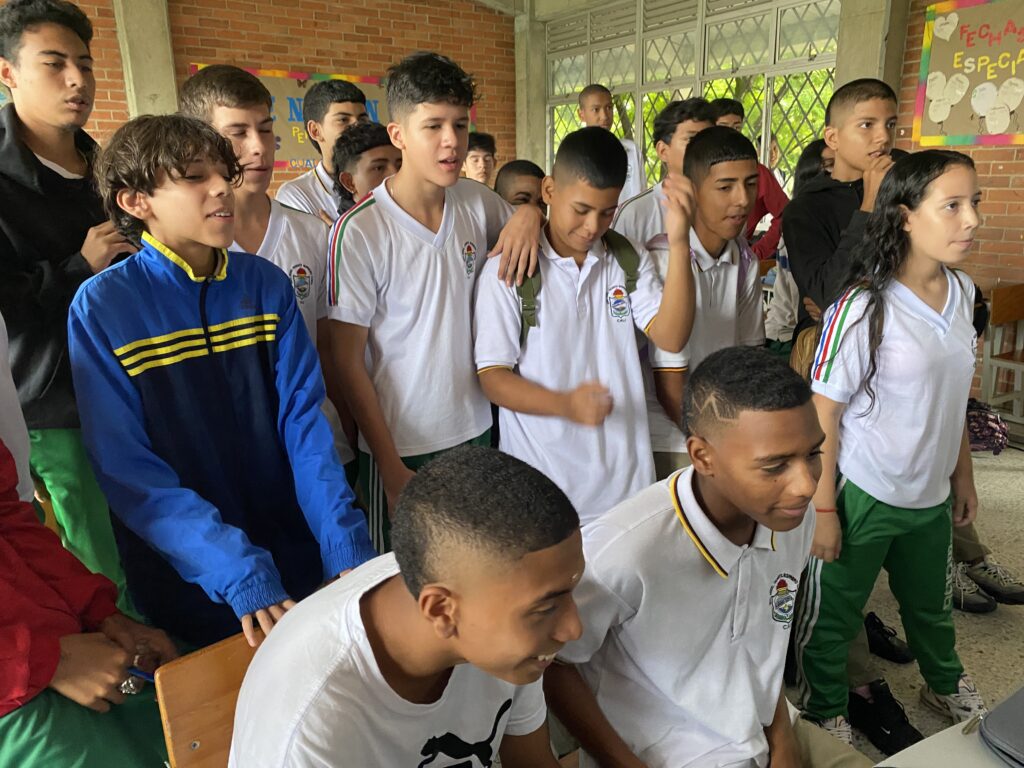Partner Schools
Our partner schools around the world (including many in USA, Colombia, Puerto Rico, Ghana, Cameroon, and more) can enhance your classroom by creating authentic communication and sharing opportunities. There are many ways to organize these exchanges, but it’s important to remember three basic steps: preparation, exchange, and reflection.

Steps:
- Fill out below partner school application form to become a parter school
- After filling out the form, you will receive the spreadsheet of other schools willing to participate.
- Using the “region” tabs at the bottom of the spreadsheet, find a school that interests you and send them an email or WhatsApp.
- Discuss possible ways to have your classes share! (See details below)
Partner School Application Form
After submitting the form you will receive an email with a link to all current partner schools.
Types of Exchange
Having students communicate with other students their same age in another county, is a valuable and engaging classroom activity. Pen pal letters can form relationships over time, and video calls can communicate thoughts and stories in present time. Both can enhance the teaching of multi-culturalism, diversity and global awareness in any classroom.
Pen Pals
Preparation:
- Use form above to add your name and school to “partner schools” list
- Contact another teacher on the list – find out how many students they have, what their schedule looks like, and who will write first, what languages they will use in letters
- Discuss common goals and topics for the letter (i.e. family, your community, school, your interests)
- Create a shared Google folder for letters
- Share a class list and make name matches (some might have to write to 2 people)
Exchange:
- Prepare your class but giving them some information about the place or town you are writing to and basic vocabulary and format for letter writing
- Give them a template to write on (using only one page and one side of paper, makes scanning easier) Example template
- Discuss school policies on sharing personal info (can they share social media names or phone numbers)
- Students write letters, have them include some questions (it helps the person replying)
- Collect and check letters (I did not correct letters, just made sure they were school appropriate and comprehensible)
- Scan and upload to shared drive and let teacher know when she can access them in the drive
Reflection:
- When your students receive a letter, have them share (with a partner or class)
- Discuss: What do you notice, what surprised you, what are similarities and differences from your culture, what questions to you have
Video Calls
Preparation:
- Use form above to add your name and school to “partner schools” list
- Contact another teacher on the list
- Discuss common goals for the call
- Discuss who will be involved in the call (one person or a group of students)
- Once you have decided on a date, create a link for the class (Zoom or Google Meet are common platforms, but be sure to check costs and time limits)
- Prepare your class by giving them some information about the place or town you are writing
- Have students create some questions they would like to ask (focus on personal opinions, rather than generalizations about a country – i.e. What’s your favorite holiday meal? Instead of What do Puerto Ricans eat on Christmas?)
- Using the Cultural Iceberg can help generate ideas (think of “below the iceberg” questions)
- Confirm date, time (note different time zones) and call link
Exchange:
- Remind students how to introduce themselves, ask their questions, listen to the answers, ask a follow up question and end the conversation; practice with a partner
- Check your computer video and audio
- Make call – I usually have 2 students come to microphone together, while rest of class is taking notes on what they understood
- Depending on students and class sizes, you can also make breakout rooms for smaller discussions and give your own discussion topics
Reflection:
- Discuss comprehensibility: How well did you understand, what did you understand/learn
- Discuss or write: What do you notice, what surprised you, what are similarities and differences from your culture, what questions to you still have
